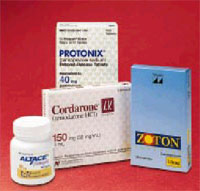|
Use
of Cordarone I.V. increased patient
survival
to hospital admission by 29 percent.
|
|
 The
cardiovascular therapies in AHP's Internal Medicine franchise continued
to grow in 2000-bolstered by recent updates of two important medical guidelines
that added the franchise's key products to their treatment recommendations. The
cardiovascular therapies in AHP's Internal Medicine franchise continued
to grow in 2000-bolstered by recent updates of two important medical guidelines
that added the franchise's key products to their treatment recommendations.
In August 2000, the American Heart Association (AHA) revised its Advanced
Cardiac Life Support Guidelines to add Cordarone I.V., an antiarrhythmic
medication, to treat ventricular fibrillation/pulseless ventricular tachycardia
in patients who do not respond to cardiopulmonary resuscitation or defibrillation.
The decision to include Cordarone I.V. in the guidelines was based
on extensive data supporting its efficacy-most notably, the ARREST trial,
in which Cordarone I.V. increased patient survival to hospital
admission by 29 percent. Cordarone I.V. sales increased 81 percent
in 2000 to $186 million.
Altace, an angiotensin-converting-enzyme (ACE) inhibitor co-promoted
in the United States by Wyeth-Ayerst and King Pharmaceuticals, Inc., received
a new indication from the FDA in 2000 to reduce the risk of stroke, heart
attack and death from cardiovascular causes in patients age 55 and over
with a history of cardiovascular disease or who have diabetes that is
accompanied by at least one other cardiovascular risk factor. Altace
is the only ACE inhibitor with this indication, which was based on evidence
from the landmark Heart Outcomes Prevention Evaluation Study. Patients
in the study taking Altace experienced 32 percent fewer strokes,
26 percent fewer cardiovascular deaths and 20 percent fewer heart attacks.
In January 2001, the American Stroke Association, a division of the AHA,
published new guidelines recommending the use of Altace to reduce
the incidence of stroke in diabetes patients.
In the gastrointestinal area, our new proton pump inhibitor (PPI), Protonix
tablets, was approved in February 2000 and launched in the United
States in May 2000 for the short-term treatment of erosive esophagitis
associated with gastroesophageal reflux disease. Despite strong competition,
Protonix achieved sales of $145 million in its first year on the
market. Additionally, an intravenous version of Protonix is expected
to be approved in the first half of 2001. This approval would position
Protonix as the first drug in its class that offers both an oral and an
intravenous formulation in the U.S. market. Zoton, a PPI which
is licensed by the Company for sale internationally, increased sales in
2000 by 12 percent to $234 million.
Research projects in Internal Medicine include rPSGL-Ig and PTP-112, discussed
on pages 9 and 10 of this report. Also, Enbrel, co-promoted by
Immunex Corporation and Wyeth-Ayerst for rheumatoid arthritis, is undergoing
Phase III clinical trials for the treatment of congestive heart failure.
|
